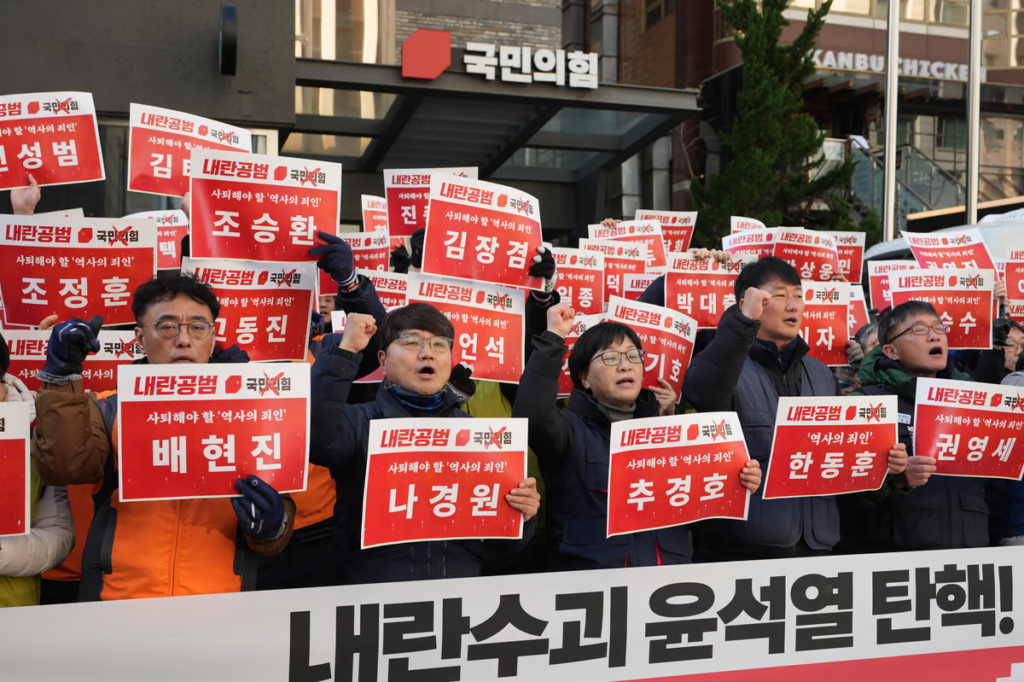South Korea’s political landscape faces a turbulent phase as President Yoon Suk Yeol finds himself entangled in a controversy following his attempt to impose martial law.
The fallout has not only resulted in a travel ban on the president but has also raised questions about the stability of South Korea’s democratic fabric.
Martial Law Declaration and Immediate Backlash
The dramatic turn of events began when President Yoon declared martial law, claiming an urgent need to combat “pro-North Korean forces” allegedly threatening the nation’s security.
This controversial move, however, plunged South Korea into unprecedented political chaos. Armed soldiers took to the streets of Seoul, the nation’s capital, and surrounded the parliament, creating an atmosphere of fear and uncertainty.
The martial law decree was met with widespread criticism from opposition leaders, civil society, and the international community.
Read : South Korea President Declares Emergency Martial Law
Dissent grew rapidly, with citizens expressing outrage over what they perceived as an authoritarian attempt to consolidate power. Political pressure mounted, forcing President Yoon to retract the decree within hours of its announcement.
Read : Top Ten Most Powerful Leaders in the World and Their Educational Qualifications
In a brief televised address, President Yoon offered an apology, describing his decision as a desperate measure. “This emergency martial law declaration stemmed from my desperation as the ultimate responsible party for state affairs,” he stated. However, his apology failed to quell the uproar, and calls for his resignation only intensified.
Political Fallout and Impeachment Drama
The opposition parties wasted no time in seizing the opportunity to challenge Yoon’s leadership. A motion to impeach the president was tabled in parliament, signaling the depth of discontent among lawmakers.
However, the impeachment attempt failed after ruling party members boycotted the vote, preventing it from reaching the required majority.
The ruling People Power Party (PPP) justified their actions by claiming that blocking the motion was necessary to prevent further division and chaos.

“We chose to resolve this crisis in a more orderly and responsible manner,” stated party representatives. Nonetheless, the decision drew criticism from opposition leaders who accused the PPP of shielding the president from accountability.
The controversy surrounding Yoon’s actions also extended to the military. The commander of South Korea’s special forces issued a public apology after revelations surfaced that his troops had been instructed to enter parliament during the martial law declaration. This admission further fueled suspicions about the president’s intentions, prompting calls for a thorough investigation.
Travel Ban and Ongoing Investigations
Amid the growing political and public discontent, South Korea’s Corruption Investigation Office confirmed that President Yoon is now subject to a travel ban.
This move, aimed at ensuring his availability for investigation, underscores the severity of the allegations against him. Prosecutors are currently considering possible charges of insurrection, which could have significant legal and political ramifications for the president.
The decision to impose the travel ban was announced during a parliamentary hearing, where the immigration services commissioner, Bae Sang-up, confirmed the restriction.
Earlier, the head of the corruption investigation agency had indicated that investigators were instructed to pursue this measure as part of their probe.

This development adds another layer of complexity to the crisis, as Yoon’s position becomes increasingly precarious. Members of his own party have suggested that the president should consider stepping down to protect the nation from further instability. Despite this, Yoon has shown no indication of resigning, instead expressing his commitment to resolving the crisis.
The travel ban on President Yoon Suk Yeol marks a significant moment in South Korea’s democratic history. It highlights the tension between executive authority and the democratic principles that underpin the nation’s governance.
As investigations proceed and political maneuvering continues, the crisis serves as a reminder of the fragile balance of power in modern democracies.
South Korea now faces the challenge of navigating this turbulent period while safeguarding its democratic values and political stability.
The outcome of the investigations and the broader implications for Yoon’s presidency will likely shape the nation’s political landscape for years to come.

